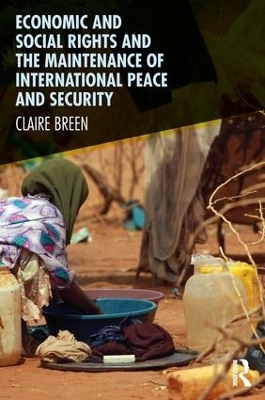
Economic and Social Rights and the Maintenance of International Peace and Security
Routledge (Verlag)
978-1-4724-6578-8 (ISBN)
Claire Breen is Associate Professor in Law at Te Piringa – Faculty of Law, University of Waikato in New Zealand. She holds a BCL from University College, Cork. She also holds an LLM (International Law) and a PhD from the University of Nottingham. Dr Breen has previously been awarded a significant New Zealand Law Foundation Grant to undertake research on a project entitled 'The National and International Legal Obligations and Consequences for New Zealand Arising from its Peace Support Operations'. Her interest in the legal obligations stemming from New Zealand's peace support missions is a reflection of her interest in the confluence between human rights law and peace operations. She has numerous publications in the area of human rights and peace operations and has also published extensively in the area of children's rights.
Contents
Preface
Acknowledgements
Dedication
Introduction
Chapter 1: The Significance of Economic and Social Rights to Peace and Security
1. Introduction
2. The Relationship between Economic and Social Conditions and a Stable Domestic and International Order
3. Economic and Social Progress: Introducing a Role for Human Rights
4. Economic and Social Rights in International Law
4.1. The Content of Economic and Social Rights: Some Recurring Themes
4.2. Frameworks for Effective Realisation
4.3. The Nature of States’ Obligations
4.3.1. Challenges to the Existence of States’ Obligations: Questions of Enforceability and Cost
4.3.2. Affirming and Explaining the Nature of States’ Obligations: the Obligations to Respect, Protect and Fulfil
5. The Rights to Equality and Non-Discrimination: Fundamental Principles for Economic and Social Rights
6. Monitoring Economic and Social Rights: the Nature and Role of Indicators
7. Conclusion
Chapter 2: Peace and Security, Socio-Economic Progress, and Human Rights: the Inseparable Roles of the Security Council, the General Assembly and the ECOSOC
1. Introduction
2. Security Council Relations with the General Assembly and the ECOSOC
2.1. The General Assembly
2.2. The ECOSOC
2.3. Staking Out the Relationship between the Security Council, the General Assembly and the ECOSOC
3. Human Rights Mechanisms: Cementing the Nexus between the Security Council, the General Assembly and the ECOSOC
3.1. The Human Rights Council’s Special Procedures Mechanism at the Security Council
3.2 The United Nations High Commissioner for Human Rights
4. The Peacebuilding Commission: Supporting the Nexus between the Security Council, the General Assembly and the ECOSOC
5. Conclusion
Chapter 3: Peacebuilding and Peace Operations: the Nexus of Peace, Economic and Social Progress and Human Rights
1. Introduction
2. Peacebuilding within the Security Council: the Economic and Social Dimensions of International Peace and Security
3. Peacekeeping Operations as a Peacebuilding Tool
4. The Role of Human Rights in Peacekeeping and Peacebuilding
5. Peacebuilding Critiqued: The Marginalisation of Socio-Economic Conditions as an Aspect of Peacebuilding
6. Conclusion
Chapter 4: Economic and Social Rights in Peacebuilding and Peacekeeping: A Measurable Legal Basis for the Economic and Social Dimensions of Peace
1. Introduction
2. The Extraterritorial Application of Economic and Social Rights
3. The Extraterritorial Application of the Rights to Food and Water, Health, Education and Work by Contributing States
4. Measuring the Impact of Economic and Social Rights in Peacekeeping Operations: the Added Value of Human Rights Indicators
5. Human Rights Indicators as a Measure of Compliance of Contributing States’ Extraterritorial Obligations
5.1. Structural, Process and Outcome Indicators Measuring the Rights to Food, Health and Work
5.2. The Rights to Water and Education: the AAAQ and AAAA Frameworks
5.3. ‘Survival’ Rights and the Right to Life
5.4. Indicators on the Rights to Equality and Non-Discrimination
6. Conclusion
Chapter 5: Reimagining Peace and Security in the Post-Conflict Environment
1. Introduction
2. Jus Post Bellum as a Philosophical Construct
3. Positive Peace and Human Security as Collective Security
4. Economic and Social Rights in the Post-Conflict Environment: the Importance of Accountability
5. Conclusion
Conclusion
| Erscheinungsdatum | 22.06.2017 |
|---|---|
| Verlagsort | London |
| Sprache | englisch |
| Maße | 156 x 234 mm |
| Gewicht | 476 g |
| Themenwelt | Recht / Steuern ► Arbeits- / Sozialrecht ► Sozialrecht |
| Recht / Steuern ► EU / Internationales Recht | |
| Recht / Steuern ► Öffentliches Recht ► Völkerrecht | |
| Sozialwissenschaften ► Politik / Verwaltung ► Europäische / Internationale Politik | |
| ISBN-10 | 1-4724-6578-4 / 1472465784 |
| ISBN-13 | 978-1-4724-6578-8 / 9781472465788 |
| Zustand | Neuware |
| Informationen gemäß Produktsicherheitsverordnung (GPSR) | |
| Haben Sie eine Frage zum Produkt? |
aus dem Bereich


